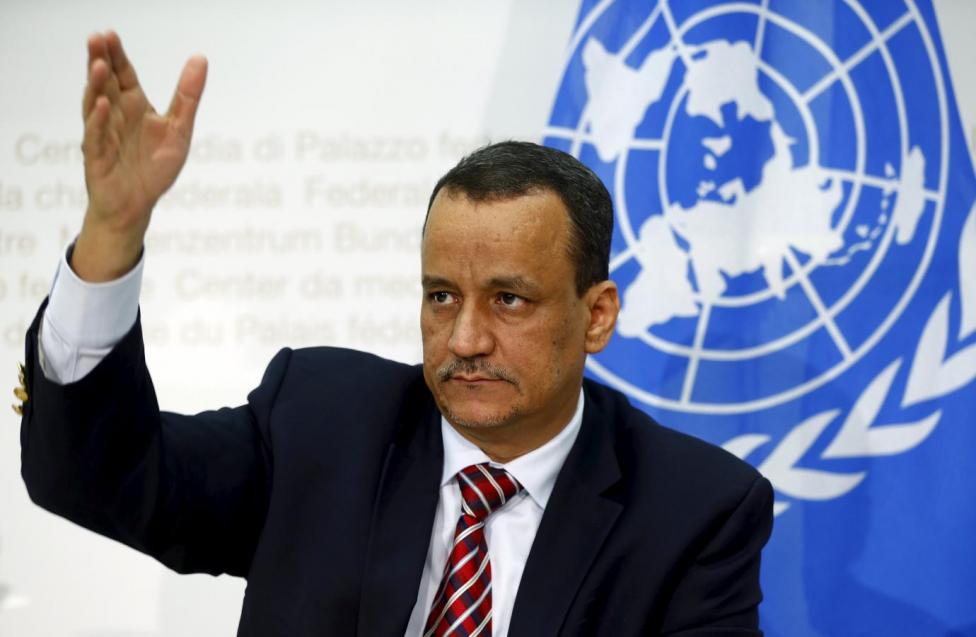Cairo, Riyadh-Yemen’s government and Houthi insurgents resumed peace talks in Kuwait on Sunday, following new conditions and pledges put forward by U.N. Special Envoy to Yemen Ismail Ould Cheikh Ahmed, who withdrew an earlier proposal to form a unity government and expressed his commitment to the implementation of U.N. Security Council Resolution 2216.
Well-informed sources told Asharq al-Awsat newspaper that the international envoy would hold separate meetings with the two delegations and would meet with officials from both conflicting parties.
Despite optimism that surrounded the resumption of peace talks, sources said that rebels were still insisting on their previous demands, while Ould Cheikh Ahmed expressed the need to abide by UNSCR 2216 and discarded an earlier proposal to form a unity government, which was inconsistent with the international resolution.
Yassim Makawi, the Yemeni president’s advisor and member of the government delegation, told Asharq al-Awsat newspaper that government’s rhetoric was focused on the achievement of sustainable peace, while the insurgents’ comments have stressed the continuation of war and destruction.
He added that Houthis did not come to Kuwait for peace and were insisting on the implementation of Iran’s negotiation strategies.
The ongoing conflict in Yemen, which began in March 2015, has claimed 9,000 lives to date.
During the opening session held on Saturday, Ould Cheikh Ahmed urged the country’s warring parties to make “decisions that will prove your true intentions.”
“It’s time for decisive decisions that will prove your true intentions and national responsibilities to Yemenis,” the international envoy said.
The government has demanded implementation of UNSCR 2216 which requires the insurgents and their allies to withdraw from areas they have occupied since 2014, including the capital Sanaa, and hand over heavy weapons.
Ould Cheikh Ahmed said the negotiations, back on after a 15-day suspension, would last for two weeks and warned they may be Yemen’s last chance for peace.
The envoy said the discussions would focus on strengthening a ceasefire that came into effect on April 11, but has been repeatedly violated.
They would also deal with “forming the military committees that will supervise the withdrawal and handover of weapons … and opening safe passages for humanitarian aid,” he said.
“I hope that you will seize this opportunity which could be the last to win the trust of the Yemeni people,” the U.N. envoy added.
Yemeni President Abd Rabbuh Mansour Hadi had previously warned that his government would boycott the talks if the U.N. envoy insisted on a roadmap stipulating a unity government that included the Houthis.
Yemeni Foreign Affairs Minister Abdul Malek Al-Mikhlafi said on Saturday that the government had obtained a written response to their demands sufficient for the political leadership to decide on sending the delegation back to Kuwait.
A well-defined timetable has been agreed that is limited to “withdrawal, handover of arms, return of state institutions, release of prisoners and lifting siege on cities” by the Iran-backed Houthis and their allies, Al Mikhlafi said.
The deal was struck after two days of talks with Ould Sheikh Ahmed in Riyadh, he said.
It was also agreed that the talks’ two-week duration will not be extended and no other issues will be debated, he added.
The delegation of Houthis and representatives of former president Ali Abdullah Saleh’s General People’s Congress party arrived in Kuwait on Friday.
The Yemeni government had announced on Thursday that it would not participate in the second round of peace talks, which were scheduled to kick off on Friday.
The head of the Yemeni government’s advisory group, Abdullah Al-Olaymi, said on his Twitter account that the Yemeni governmental delegation would be ready to go to Kuwait when the atmosphere of consultations becomes appropriate.
